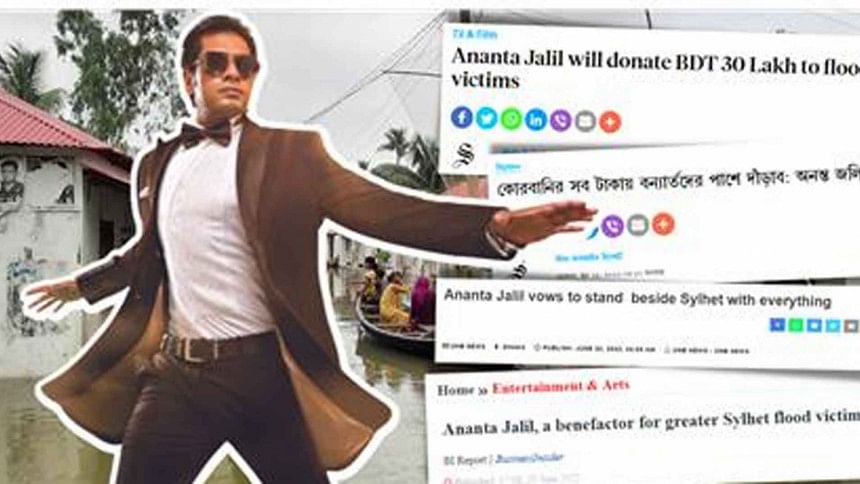Why I’m a fan of Ananta Jalil

I have to admit it, I am becoming a fan of Ananta Jalil. Not because of the explosive, deafening trailer of his latest movie, Din: The Day – a Bangladeshi-Iranian joint venture shot in Iran where AJ ("A Zay") the superhero is performing logic-defying stunts, shooting a hundred bad guys while keeping his makeup intact and sporadically sporting his long auburnish w-i-g – ahem, mane. Neither is it because of that distinctive diction we so love as he makes speeches, listing the accomplishments of Bangladesh including how it has hosted the Rohingya refugees (which, I am sure, is somehow relevant to the intricate plot involving Afghani terrorists, drug cartels and an extravaganza of guns that would put the staunchest supporter of the National Rifle Association of America to shame).
No, this time it's because of Ananta Jalil the human being.
When news of the devastating floods and human suffering started coming in, we were pleasantly surprised by a Facebook post from the much reviled and revered star. Ananta Jalil, of "Mansester" and "orenz zues" fame, without any cringe-worthy utterings, announced he would stand by the flood victims and help them as much as he could. He would donate money for relief from profits earned from his business and movies. Admittedly, one would have wished he hadn't mentioned that he would sacrifice one or two cows instead of the usual 12 and donate the money instead, but at least we know his heart is in the right place. According to news reports, he will be donating Tk 30 lakh for flood victims. What's more, he has urged the well-off to do the same.
In fact there are individuals, NGOs and private organisations (like Bidyanondo Foundation) taking the initiative to help. The biggest challenge is to actually reach the relief to the people in remote areas where the water is so choppy and the weather so volatile, even the armed forces are finding it difficult to navigate. Tour operators like Onirban Boat have turned their holiday cruise boats into rescue boats, picking up stranded people from the remote areas, taking them to shelters. A number of tourism agencies part of the e-Tourism Association of Bangladesh used their boats stationed in remote areas to rush to the stranded people, housing them, providing food and carrying relief items. They are trying to raise funds from members and other sources to continue their relief operations. A barrister, Syed Sayedul Haque Suman, announced on his Facebook page that he has raised Tk 97 lakh in just two days. Bangladeshi expatriates in the US are raising funds to arrange relief to be reached to the stranded.
These are heartwarming examples of spontaneous empathy and quick action. But they are still far from being adequate considering the widespread, prolonged nature of this catastrophe. An estimated 7,334,000 people have already been affected in Sunamganj, Sylhet, Moulvibazar, Netrokona, Kishoreganj, Habiganj, Brahmanbaria, and Mymensingh. This is an ongoing humanitarian disaster, the financial, social and health effects of which will continue for months on end. In the meantime, every second counts and people's lives are on the line. So, why isn't there a more enthusiastic response from the wealthier sections of society?
It brings us to the issue of a bubble culture – people inside the bubble are impervious to the suffering of others as long as they do not know them and definitely if those suffering are part of the "invisible masses." They will cry oceans with the tortured heroine and battered hero in their favourite drama serial but will feel nothing for the real life heroes and heroines battling for their very lives as the waters swallow up all their belongings, their homes, their crops, food, possessions, their cattle and, terrifyingly, sometimes even their loved ones. They will not know about the mother and her five children who have not eaten for two days, the farmer who has lost all the paddy he had kept to sell and feed his family in the coming months or the thousands of families who await a bleak future of destitution and endless borrowing from loan sharks just to stay alive. What kind of Eid these people can expect to have is not something the majority of the rich have time to think about.
There is a disturbing obtuseness among the wealthy that makes them unmoved by the acute suffering of their compatriots who are lower down the social ladder. Perhaps the floods in Sunamganj or Sylhet are not part of their newsfeed as much as the latest update on Amber Heard and Johnny Depp. Perhaps we need to revive the photo opportunities of the old days when anyone could get their few seconds of fame by handing a check to the PM's relief fund and be seen on BTV news while doing so. It is strange that people will spend huge amounts of money for the salvation of their soul or a confirmed seat in paradise but not for helping someone just for the sake of helping. Why is philanthropy so rare in Bangladesh, despite the rising number of millionaires?
There is something ignoble about a class of people which spends obscene amounts of money on jewellery, watches, cars, and expensive holidays in Europe but have hardly any money to spare for charity just to be good human beings. Ananta Jalil has stated what rich people are supposed to do with their money – share it with the needy, helpless, and distressed. The privileged in society should listen to his appeal and stand by their brothers and sisters whose lives have been turned upside down by this disaster. If we can't help them directly, we can always give our money to groups and organisations involved in rescue and relief. Sometimes we just need to be reminded of the obvious, as Ananta Jalil philosophically stated in his Facebook video: You can't take your wealth to the grave.
Aasha Mehreen Amin is joint editor at The Daily Star.

 For all latest news, follow The Daily Star's Google News channel.
For all latest news, follow The Daily Star's Google News channel. 









Comments